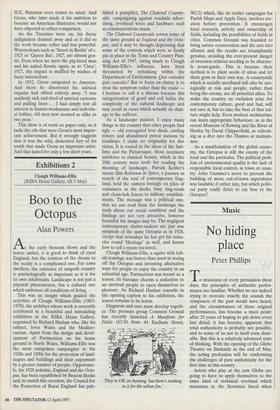Exhibitions 2
Clough Williams-Ellis (RIBA Heinz Gallery, till 5 May)
Boo to the Octopus
Alan Powers
As the early blossom blows and the leaves unfurl, it is good to think of rural England, but the relation of the dream to the reality is a complicated one. For town dwellers, the existence of unspoilt country is psychologically as important as it is for its own inhabitants. Landscape is not just a physical phenomenon, but a cultural one which embraces all conditions of living.
This was an insight which guided the activities of Clough Williams-Ellis (1883- 1978), the architect whose work is currently celebrated in a beautiful and stimulating exhibition at the RIBA Heinz Gallery, organised by Richard Haslam who, like his subject, loves Wales and the Mediter- ranean. Apart from the design and devel- opment of Portmeirion on his home ground in North Wales, Williams-Ellis was the most outspoken campaigner in the 1920s and 1930s for the protection of land- scapes and buildings and their enjoyment by a greater number of people. Opportune- ly, his 1928 polemic, England and the Octo- pus, has been republished by Beacon Books and, to match this occasion, the Council for the Protection of Rural England has pub- lished a pamphlet, The Cluttered Country- side, campaigning against roadside adver- tising, overhead wires and hardware such as communications masts.
The Cluttered Countryside covers some of the same ground as England and the Octo- pus, and it may be thought depressing that some of the controls which were so firmly put in place in the Town and Country Plan- ning Act of 1947, owing much to Clough Williams-Ellis's influence, have been threatened by rethinking within the Department of Environment. Quis custodiet ipsis custodes? But to focus on clutter is to treat the symptom rather than the cause — I hesitate to call it a disease because this categorisation of good and evil belies the complexity of the cultural landscape and may result in cures which actually do dam- age to the sufferer.
As a landscape painter, I enjoy many things in the country that other people find ugly — old corrugated iron sheds, cooling towers and abandoned petrol stations by roadways. I claim no originality for this vision. It is rooted in the ideas of the Sub- lime and the Picturesque, those necessary antidotes to classical beauty, which in the 18th century were tools for reading the meaning of landscape. Patrick Keiller's recent film Robinson in Space, a journey in search of the soul of contemporary Eng- land, held the camera lovingly on piles of containers in the docks, busy ring-roads and chain-link fences to military establish- ments. The message was a political one, that we can read from the landscape the truth about our social condition and the findings are not very attractive, however beautiful the images may be. The negligent contemporary clutter-makers are just one symptom of the same Octopus as in 1928, except that nowadays he has got his tenta- cles round 'Heritage' as well, and knows how to sell a mean tea-towel.
Clough Williams-Ellis, a squire with left- ish leanings, was braver than most in seeing off the Octopus and inventing alternative ways for people to enjoy the country in an industrial age. Portmeirion was meant as a lesson, its baroque charms a seduction to an unvisual people to open themselves to pleasure. As Richard Haslam remarks in the opening caption to his exhibition, the lesson remains to be learnt.
Diagnosis and cure must develop togeth- er. The pressure group Common Ground has recently launched A Manifesto for Fields (£3.50 from 44 Earlham Street, 'They're OK on hunting but there's nothing in it for the urban fox.' WC2) which, like its earlier campaigns for Parish Maps and Apple Days, involves cre- ation before prevention. It encourages local research, activity and ownership of fields, including the possibilities of fields in cities. Common Ground was founded to bring nature conservation and the arts into alliance and the results are triumphantly genuine, avoiding the ever-present danger of tweeness without needing to be obscure- ly avant-garde. This is because their method is to plant seeds of ideas and let them grow in their own way. A countryside which is socially moribund will also be eco- logically at risk and people, rather than being the enemy, are all potential allies. To make the country an exclusion zone for contemporary culture, good and bad, will not save it, but to take the best of that cul- ture might help. Even modern architecture can learn appropriate behaviour, as in the recent Museum of Rowing and the River at Henley by David Chipperfield, as refresh- ing as a dive into the Thames at midsum- mer.
As a manifestation of the global econo- my, the Octopus is still the enemy of the local and the particular. The political prob- lem of environmental quality is the lack of responsible local control, in town or coun- try. John Gummer's move to prevent the building of more out-of-town superstores was laudable if rather late, but which politi- cal party really dares to say boo to the Octopus?


































































 Previous page
Previous page